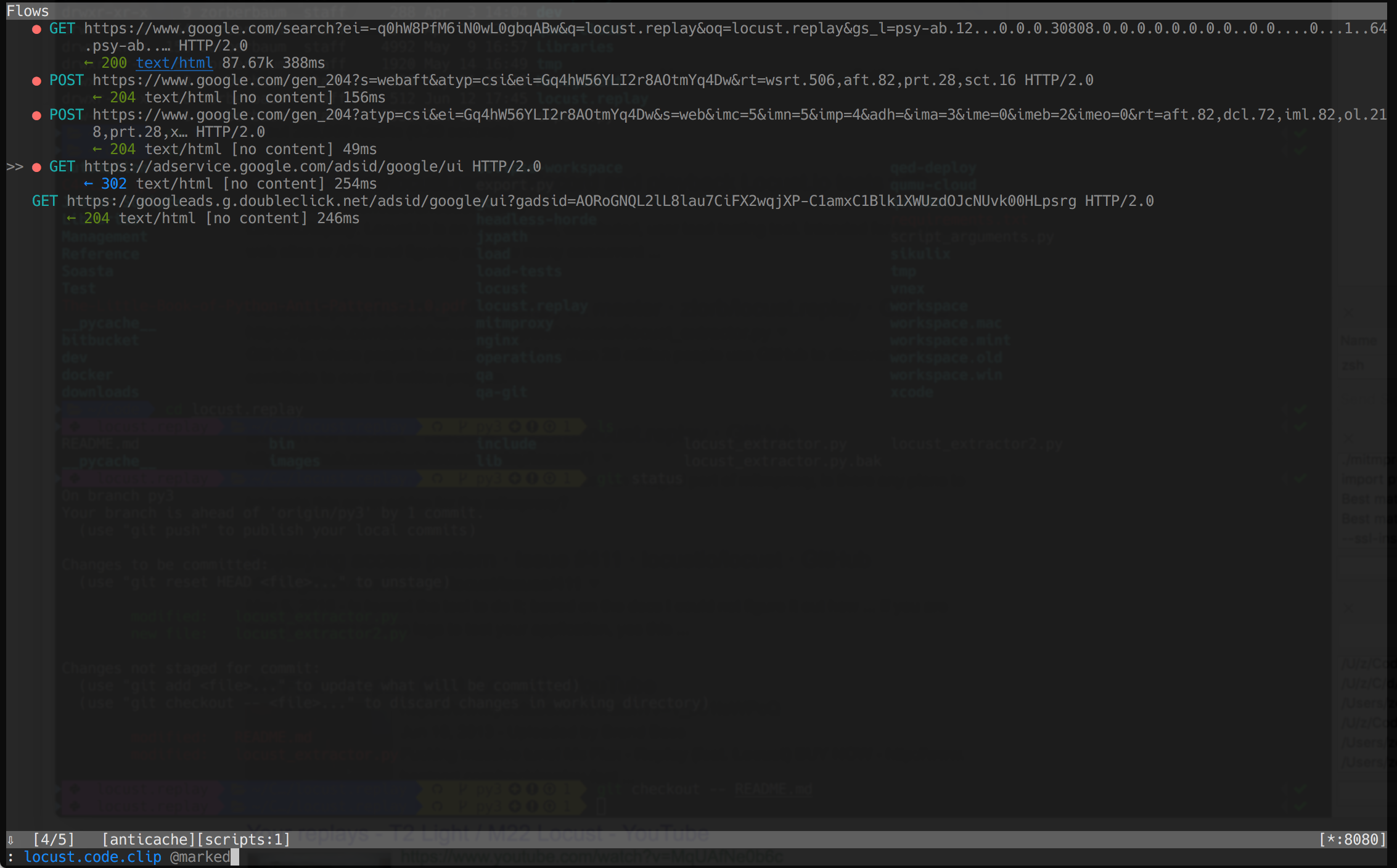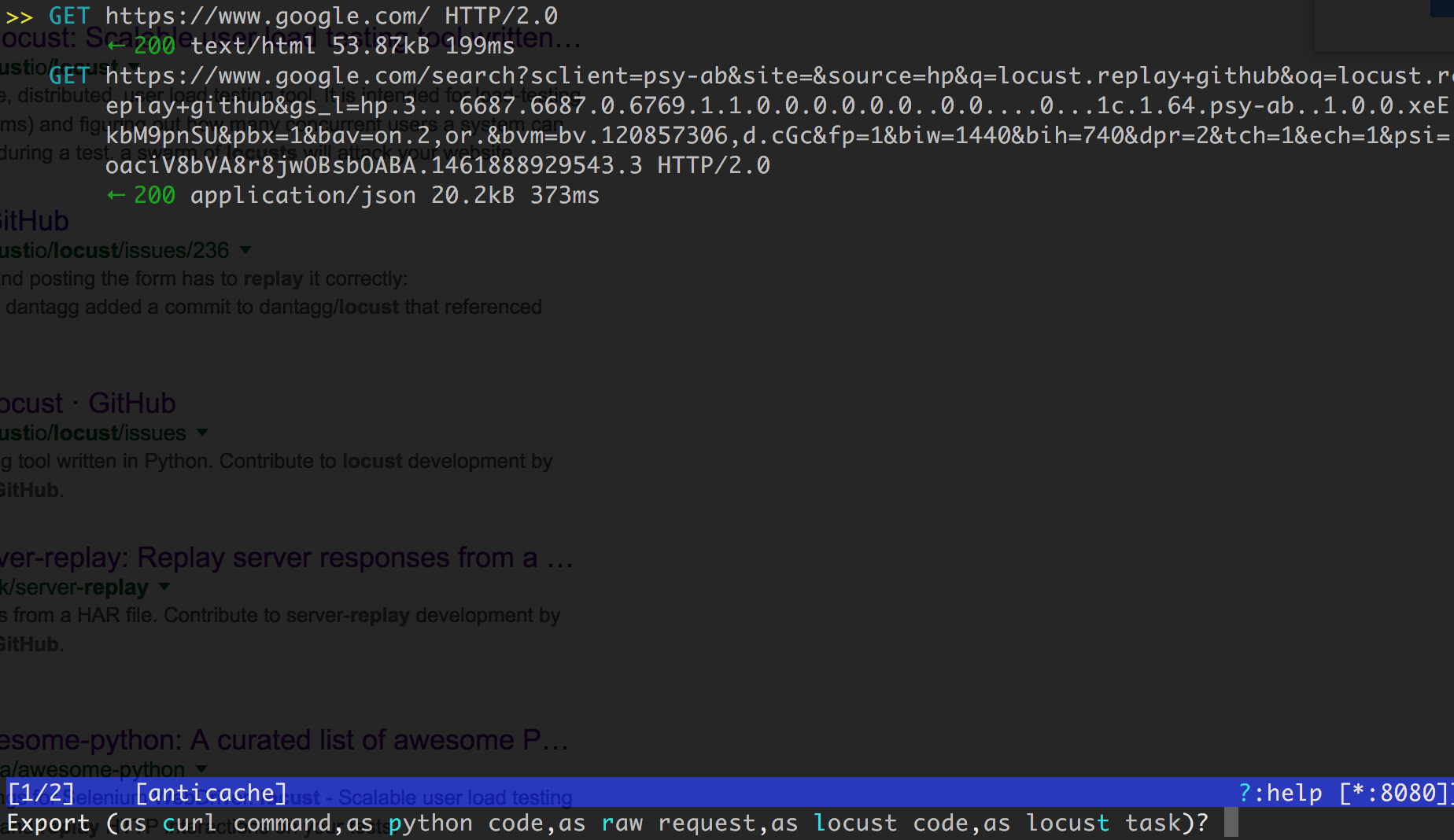Locust.io is an easy-to-use, distributed, user load testing tool. Intended for load testing web sites or APIs and figuring out how many concurrent users a system can handle.
Sometimes, one needs to get basic load test up and running quickly, for a non-trivial set of interactions. One possible approach could be recording a session with the system under test and the replay it at higher loads.
This is where mitmproxy comes into play. mitmproxy is an interactive console program that allows traffic flows to be intercepted, inspected, modified and replayed.
mitmproxy developers have been generous to allow my pull-request, which lets users export flows captured to locust script format. This way a test session that involves multiple interactions can be developed within minutes.
Following is a simple example, that explains this concept.
Obviously, mitmproxy and locust have to be installed. Please follow the corresponding user manuals for mitmproxy and locust. It is beyond the scope of this document to explain basic usage for these tools.
-
A couple of options are available:
- mitmproxy version >= 3.0 up to latest github code - use
locust_extractor.py(for python3). - mitmproxy version >=0.18 and <1.0 (legacy) - use
locust_extractor2.py(for python2 backward compatability).
For new mitmproxy, please donwload locust_extractor.py to your system, and note the path to the download location. One could use the add-ons folder under mitmproxy installation.
Legacy file is available as part of mitmproxy installation.
- mitmproxy version >= 3.0 up to latest github code - use
-
Run mitmproxy, for example, when using new mitmproxy:
mitmproxy --anticache -s <path to>\locust_extractor.py --set filename_prefix=<file prefix>In the legacy use-case, simply:
mitmproxy --anticache -
Configure a client (such as a browser) to use it as a proxy, if needed.
-
Perform the manual test session, simulating a single user. In this example we will search the web.
-
On mitmproxy cosole, locust.replay functionaliy is available as commands at the prompt (started by typing “:“):
-
locust.code.clip <flow>where
<flow>can be @all, @focus, @hidden, @marked, @shown, or @unmarked (please see mitmproxy documentation for explanation on each). Full code will be copied to the clipboard. This code may not be valid if multiple destination hosts are selected. From the clipboard you can paste the code to your favorite editor. -
locust.task.clip <flow>where
<flow>can is the same as above. Locust tasks code will be copied to the clipboard. This code may not be valid if multiple destination hosts are selected. -
locust.extractAllAll flows will be extracted to files, with names based on provided file prefix and destination host.
The same will happen when exiting mitmproxy.
-
For example, export marked flows to clipboard as locust code:
- On mitmproxy console, select the first flow, i.e., the flow that should initialize each user session. Then press the E key, which is a shortcut for Export and then press l, for locust code.
- The code will be placed in your clipboard. Pasting it to your favorite editor will result in something like:
from locust import HttpLocust, TaskSet, task
class UserBehavior(TaskSet):
def on_start(self):
''' on_start is called when a Locust start before any task is scheduled '''
self.www_google_com_1461888928_75()
@task()
def www_google_com_1461888928_75(self):
url = self.locust.host + '/'
headers = {
':method': 'GET',
':path': '/',
':authority': 'www.google.com',
':scheme': 'https',
'user-agent': 'Mozilla/5.0 (Macintosh; Intel Mac OS X 10.11; rv:46.0) Gecko/20100101 Firefox/46.0',
'accept': 'text/html,application/xhtml+xml,application/xml;q=0.9,*/*;q=0.8',
'accept-language': 'en-US,en;q=0.5',
'accept-encoding': 'gzip, deflate, br',
}
self.response = self.client.request(
method='GET',
url=url,
headers=headers,
)
### Additional tasks can go here ###
class WebsiteUser(HttpLocust):
task_set = UserBehavior
min_wait = 1000
max_wait = 3000- Save this code to a .py file. This file is already a useable locust test script, which can be invoked from command-line. For example:
locust -f <your_file_name.py> --master -H <https://your_server_under_test>
-
Now you can pick any additional flows from mitmproxy. For each one, select the flow, and then press the E key, and then press t, for locust task
-
Paste the new code immediately under the line
### Additional tasks can go here ###in the code above. -
The code will now be similar to:
from locust import HttpLocust, TaskSet, task
class UserBehavior(TaskSet):
def on_start(self):
''' on_start is called when a Locust start before any task is scheduled '''
self.www_google_com_1461888928_75()
@task()
def www_google_com_1461888928_75(self):
url = self.locust.host + '/'
headers = {
':method': 'GET',
':path': '/',
':authority': 'www.google.com',
':scheme': 'https',
'user-agent': 'Mozilla/5.0 (Macintosh; Intel Mac OS X 10.11; rv:46.0) Gecko/20100101 Firefox/46.0',
'accept': 'text/html,application/xhtml+xml,application/xml;q=0.9,*/*;q=0.8',
'accept-language': 'en-US,en;q=0.5',
'accept-encoding': 'gzip, deflate, br',
}
self.response = self.client.request(
method='GET',
url=url,
headers=headers,
)
### Additional tasks can go here ###
@task()
def search(self):
url = self.locust.host + '/search'
headers = {
':method': 'GET',
':path': '/search?sclient=psy-ab&site=&source=hp&q=locust.replay+github&oq=locust.replay+github&gs_l=hp.3...6687.6687.0.6769.1.1.0.0.0.0.0.0..0.0....0...1c.1.64.psy-ab..1.0.0.xeEkbM9pnSU&pbx=1&bav=on.2,or.&bvm=bv.120857306,d.cGc&fp=1&biw=1440&bih=740&dpr=2&tch=1&ech=1&psi=oaciV8bVA8r8jwOBsbOABA.1461888929543.3',
':authority': 'www.google.com',
':scheme': 'https',
'user-agent': 'Mozilla/5.0 (Macintosh; Intel Mac OS X 10.11; rv:46.0) Gecko/20100101 Firefox/46.0',
'accept': 'text/html,application/xhtml+xml,application/xml;q=0.9,*/*;q=0.8',
'accept-language': 'en-US,en;q=0.5',
'accept-encoding': 'gzip, deflate, br',
'dnt': '1',
'referer': self.locust.host + '',
}
params = {
'sclient': 'psy-ab',
'site': '',
'source': 'hp',
'q': 'locust.replay github',
'oq': 'locust.replay github',
}
self.response = self.client.request(
method='GET',
url=url,
headers=headers,
params=params,
)
class WebsiteUser(HttpLocust):
task_set = UserBehavior
min_wait = 1000
max_wait = 3000-
Repeat for any number of flows.
-
Review carefully the generated code, and fix / update headers, params, and any other message component as required. Check also that no indentation mistakes happened during the pasting of the code.
-
The new load script will hit all flows added. Please consult locust documentation for how to tune and tweak this code further to your needs.
Extracting flows via clipboard may lose its charm after a while. At that point, we can use mitmdump with script execution, toghether with our downloaded locust_extractor.py. Please refer to mitmdump documentation for more command-line details. For example, start by invoking:
New mitmproxy:
mitmdump --anticache -s <path to>\locust_extractor.py --set filename_prefix=<file prefix>
Legacy mitmproxy:
mitmdump --anticache -s "locust_extractor.py <file prefix>"
Then proceed with configuring the client or browser to use the mitmdump proxy, and perform the test actions. When done, stop the mitmdump process. This will result in mitmdump creating a locust script for each of the hosts contacted during the recorded session, using the given file name as prefix.
- To scale your load tests to the cloud, check other projects, like:
Thanks for your contribution to this project:
- @chrismarch


